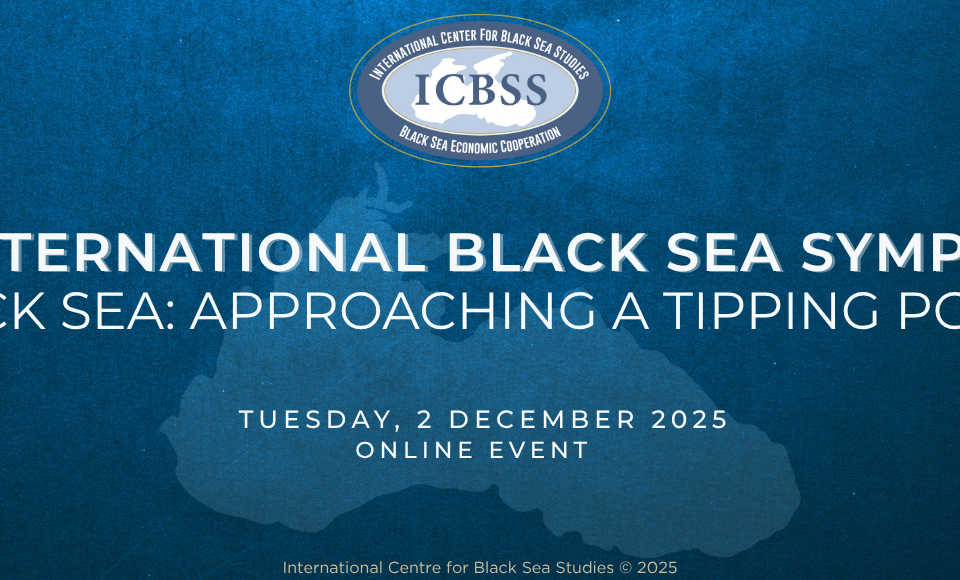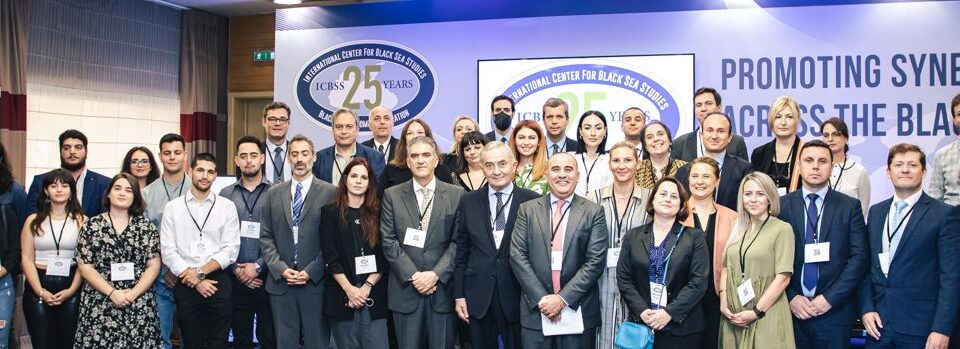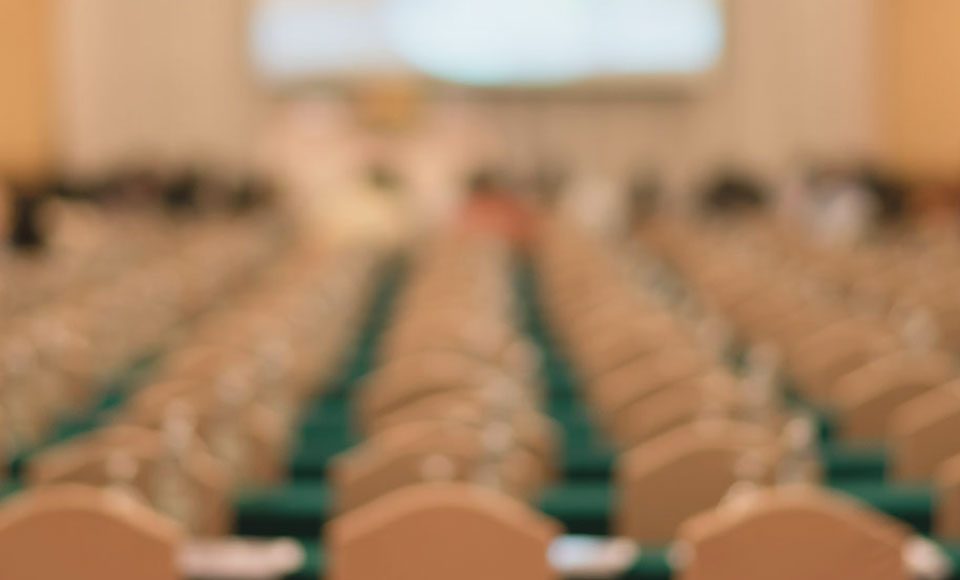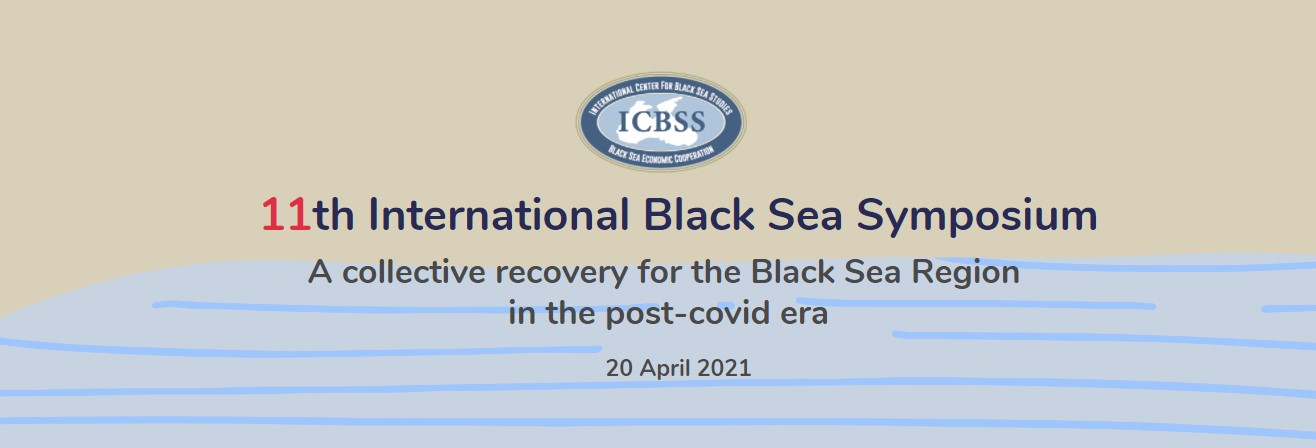
The International Centre for Black Sea Studies (ICBSS) successfully hosted its 11th International Black Sea Symposium, on“A collective recovery for the Black Sea Region in the post-covid era”, on 20 April 2021.
The online event was moderated by Dr. Gerasimos RODOTHEATOS, Public International Law Teaching Scholar at Panteion University of Athens.
The 11th IBSS aimed to offer a platform for dialogue among stakeholders to discuss challenges for, and best practices of national and regional response to the pandemic since the covid-19 outbreak, as well as to exchange views on opportunities and synergies for a sustainable socioeconomic plan for a collective recovery in the Black Sea region.

Opening the Symposium, ICBSS Director General, Mr. Georgios MITRAKOS welcomed all participants and distinguished speakers from the wider Black Sea community to the first ever virtual ICBSS Symposium, which allowed all parts to exchange views for the day after regarding the national and regional response to the current pandemic.
A welcome note was delivered by Mr. Akaki LOMIDZE, Head of Division of Multilateral and Regional Economic Cooperation of the Dept. of International Economic Relations, Ministry of Foreign Affairs of Georgia and Chairman of the Board of Directors of the International Centre for Black Sea Studies (ICBSS). After welcoming speakers and participants, the newly elected ICBSS Chairman stressed the chance to high-quality expertise and knowledge that the Symposium offers, and the very important role that it plays as a part of the regional cooperation agenda for the debates to come. In addition, Mr. Lomidze highlighted that the 11th IBSS constitutes “the beginning of a long and fruitful cooperation within the framework of ICBSS and BSEC family to find a common ground for joint response to the new recent challenges, and to make our region a better place to live”.

Discussions were launched by the In Focus Session of this year’s Symposium that hosted two distinguished speakers, H.E. Amb. Michael B. CHRISTIDES, Secretary General of the BSEC PERMIS and Mr. Jeroen WILLEMS, Deputy Head of Unit, NEAR.C.2 Armenia, Azerbaijan, Belarus & Eastern Partnership of the European Commission, that offered information on the regional response to the pandemic. The BSEC Secretary General highlighted the latest developments in regional cooperation, focusing on tourism and transportation, and the newly launched BSEC Covid-19 Information Platform, while in his conclusions, expressed a positive view regarding the collective recovery in the post-covid era: “International and regional cooperation will do come out stronger and more effective”.
On his part, Mr. Willems provided details on the supportive framework developed since the pandemic outbreak to support the Eastern Partnership countries and underlined the importance of resilience for the future of the Eastern Partnership policy framework, and cited the five clear policy objectives that are needed for a direction of a strengthen resilience: a) economy and connectivity, b) strengthening rule of law and security, c) green transformation, d) digital transformation, e) fair and inclusive society.
The Symposium was centered on three Sessions, touching upon the main pillars of socioeconomic recovery, i.e. national strategy, economic response and support to research and development.
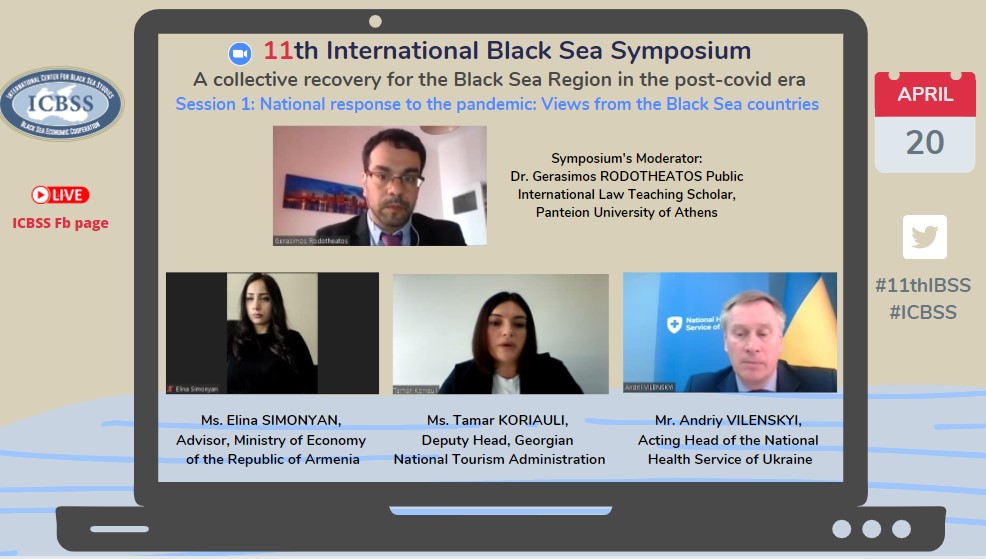
Session I on “National response to the pandemic: Views from the Black Sea countries” accommodated the presentation of the national strategies developed to tackle the pandemic, the challenges, priorities and best practices of the national administrations, as well as the future perspectives, ideas and plans for a smooth transition to the day after the pandemic. To this point, Ms. Elina SIMONYAN, Advisor, Ministry of Economy of the Republic of Armenia, Ms. Tamar KORIAULI, Deputy Head, Georgian National Tourism Administration, and Mr. Andriy VILENSKYI, Acting Head of the National Health Service of Ukraine, described in a thorough way their countries’ response, emphasizing specific priority sectors.

During Session II on “Post-pandemic economic recovery: challenges and priorities”, Mr. Ghinea Arminio IORGA, Head, Policy and Strategy, Black Sea Trade and Development Bank (BSTDB), Mr. Stavros KALOGNOMOS, Executive Secretary, Balkan and Black Sea Commission, Conference of Peripheral Maritime Regions of Europe(CPMR), Ms. Patrizia BUSOLINI, Policy Officer, Directorate-General for Maritime Affairs and Fisheries, Sea-basin Strategies, Maritime Regional Cooperation and Maritime Security, European Commission, Prof. Dr. Alexandru STRATAN, Director, National Institute for Economic Research of the Republic of Moldova, were invited to provide information about the initiatives developed by their respective institutions or other existing regional frameworks, to support the economic recovery for the Black Sea countries. Furthermore, the speakers discussed the challenges and opportunities in the past one year since the Covid-19 outbreak and shared their opinions about the day after.
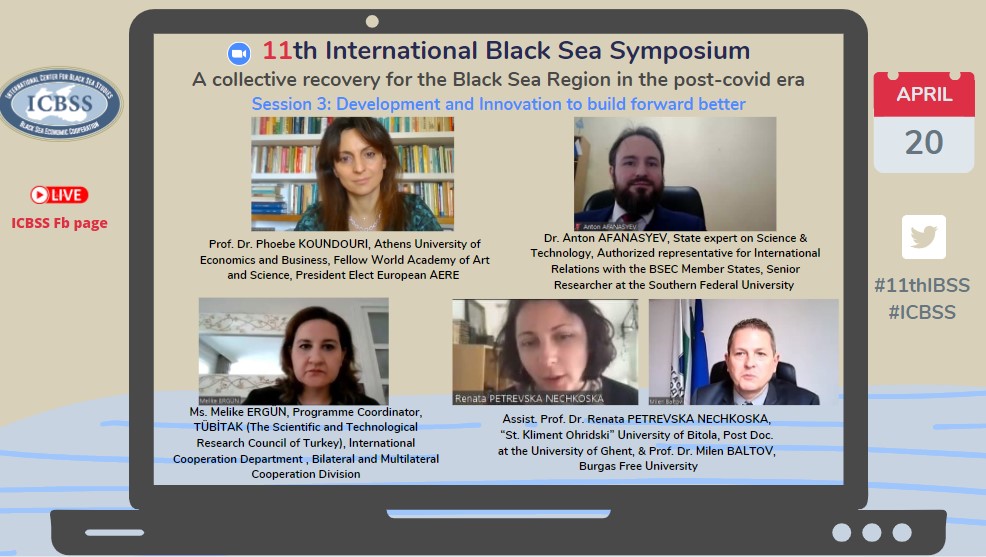
At the last Session III on“Development and Innovation to build forward better”, the speakers presented the initiatives developed by institutions or any other national actors for the support of research, development and innovation during the pandemic. More specifically, Prof. Dr. Phoebe KOUNDOURI, Athens University of Economics and Business, Fellow World Academy of Art and Science, President Elect European AERE, Dr. Anton AFANASYEV, State expert on Science & Technology, Authorized representative for International Relations with the BSEC Member States, Senior Researcher at the Southern Federal University, Ms. Melike ERGÜN, Programme Coordinator, TÜBİTAK (The Scientific and Technological Research Council of Turkey), International Cooperation Department, Bilateral and Multilateral Cooperation Division, Assist. Prof. Dr. Renata PETREVSKA NECHKOSKA, “St. Kliment Ohridski” University of Bitola, Post Doc. at the University of Ghent, & Prof. Dr. Milen BALTOV, Burgas Free University, outlined relevant research results and initiatives to support R&D in the region and set the basis for a sustainable recovery from the current pandemic.
At Q&A that followed each session, speakers and participants had the opportunity to exchange multiple views about the above-mentioned issues. The webinar was open to public and welcomed the participation of a wide range of regional stakeholders. In total, more than 80 participants from the wider Black Sea region joined the Symposium.

